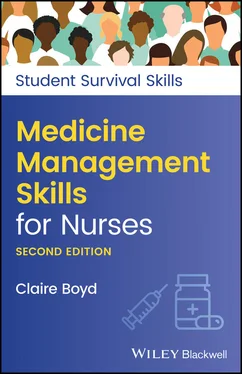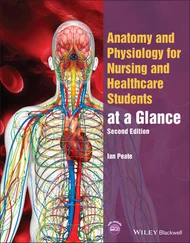Oxygen therapy information added – tick
More case studies – tick
Drugs that may contribute to falls in frail adults – tick
More on cultural considerations in medicines management – tick
The book is designed to take you from your first day ‘on the job’ to your qualification, and beyond. It covers all areas of medicines management, for the acute hospital to the community, adults, and paediatrics.
Nursing is a dynamic field and the book is evidence‐based and looks at the theory and practice of drug administration briefly and coherently. The pharmaceutical industry is forever evolving and new drugs are coming onto the market regularly. Take time to talk to your patients to gain an understanding of drugs you may not have seen before. Pick up the new editions of the British National Formulary or go on‐line to access it (adult and paediatric editions) and dip into this source of information regularly.
Please remember that there are many areas within the clinical skill of drug administration that a student is not permitted to undertake. For instance, you may not give intravenous drugs. This does not mean that you can't observe these drugs being prepared and administered by professionals. Never perform any task that you are not permitted to undertake, even if you are asked to do so.
My final tip to you is never administer a drug to anyone without knowing what it does and why it has been prescribed and all the contra‐indications. Lastly, take your time when administering medicines and never cut corners.
As always, first acknowledgements go to the healthcare workers (Nurses, Nursing Associates, Assistant Practitioners, etc). I have had the honour of teaching in the skill of medicines management. As with the other books in the Series, it is their tips and quotes that have been used throughout the book. In short, what you wanted in a Medicines Management book.
Thanks also go to Magenta Styles (Executive Editor at Wiley Blackwell) for her guidance, and to the team at Wiley's for all their assistance and support.
This book is dedicated to my loving family: my wonderful husband Rob (for the photographs), Simon and Louise and David for allowing me to use photographs of their body parts: nose, ears, eyes, and fingers (what did you think I meant?). To my gorgeous grandsons Owen and Rhys – the light of our lives. Thank you, my family, for supporting me in my book‐writing foray.

| Time |
24‐hour clock |
| 1 a.m. |
01:00 |
| 2 a.m. |
02:00 |
| 3 a.m. |
03:00 |
| 4 a.m. |
04:00 |
| 5 a.m. |
05:00 |
| 6 a.m. |
06:00 |
| 7 a.m. |
07:00 |
| 8 a.m. |
08:00 |
| 9 a.m. |
09:00 |
| 10 a.m. |
10:00 |
| 11 a.m. |
11:00 |
| 12 midday |
12:00 |
| 1 p.m. |
13:00 |
| 2 p.m. |
14:00 |
| 3 p.m. |
15:00 |
| 4 p.m. |
16:00 |
| 5 p.m. |
17:00 |
| 6 p.m. |
18:00 |
| 7 p.m. |
19:00 |
| 8 p.m. |
20:00 |
| 9 p.m. |
21:00 |
| 10 p.m. |
22:00 |
| 11 p.m. |
23:00 |
| 12 midnight |
24:00 |
Chapter 1 DRUG ADMINISTRATION: GENERAL PRINCIPLES

Medicine Management Skills for Nurses , Second Edition. Claire Boyd.
© 2022 John Wiley & Sons, Ltd. Published 2022 by John Wiley & Sons Ltd.
By the end of this chapter you will have an understanding of the general principles of drug administration, including improving medication safety factors.
You may well worry about making mistakes. Everyone is human after all and prone to error (known as ‘Human Factors’). The key is to minimise where the faults can occur. As health carers we always put the patient first and apply our professionalism. As with any clinical skill we need to highlight the importance of vigilance, knowledge, and professionalism when administering drugs, as many drug errors occur when staff fail to follow correct procedures or do not recognise the limitations of their own knowledge and skill. Let's look at the cost of drug errors, both monetary and to the individual.
 Professionalism in nursing
Professionalism in nursing
Nurses are expected to display competent and skilful behaviour.
When administering medication, we need to be aware of the following:
It is not solely a mechanistic task to be performed in strict compliance with the written prescription of a medical practitioner.
It requires thought and the exercise of professional judgement (Lister, Hofland, and Grafton 2020).
What does this actually mean? Let's look at an example.
 Question 1.1
Question 1.1
1 If a patient has senna and lactulose prescribed and informs you that they have opened their bowels four times that day, do you administer their prescribed laxatives?
Also remember, it is very easy to get distracted, and lose concentration in the clinical area, so always concentrate on the job in hand.
What is a drug error? Well, the Department of Health informs us that:
A medication error is any preventable event that may cause or lead to inappropriate medication use or patient harm while the medication is in the control of health professional, patient, or consumer.
Because nurses predominately administer drugs, they are often the last potential barrier between a medication error and serious harm to a patient, with drug errors frequently featuring in professional misconduct cases.
It is estimated that there are more than 230 million medication errors per year in the National Health Service (NHS). The cost to the NHS was estimated at £98.5 million for the 712 confirmed deaths from drug errors in hospital. However, if we add on the extra cost of patients made seriously ill, or potentially killed by drug errors in primary care, the estimated cost to the NHS is £1.6 billion (yes – billion!) equating to 3.8 million bed days.
Читать дальше



 Professionalism in nursing
Professionalism in nursing Question 1.1
Question 1.1










